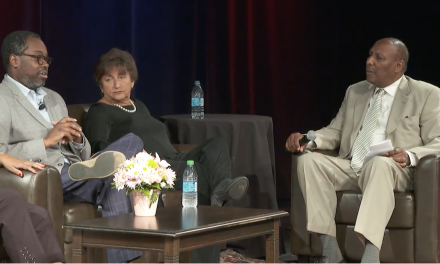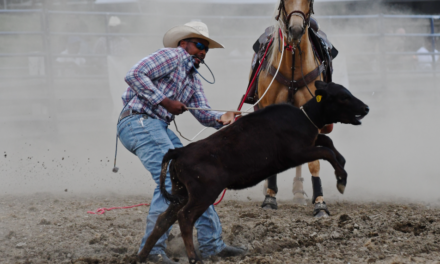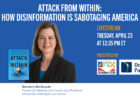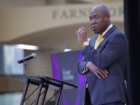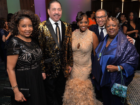Stephen Henderson has a candid conversation about the 2020 election with civil rights activists Rev. Al Sharpton of the National Action Network and Rev. Horace Sheffield III of the Detroit Association of Black Organizations. They analyze the divisive presidential race, the potential results, and the impact on the African American community. Plus, they talk about what the Democratic Party looks like going forward, specific issues facing Detroiters, and the future outlook for race relations and the protests against racial injustice.
Read full transcript
Stephen Henderson Welcome to American Black Journal. I’m Stephen Henderson.
What a week it has been. A record number of Americans cast their ballots and one of the most divisive presidential elections we have ever seen. And now, as I record this program, two days after Election Day, votes are still being counted and the race is still too close to call. Regardless of the final outcome, perhaps the larger question is where do we go from here as a nation? Posed this question and much more to Reverend Al Sharpton, founder of the National Action Network, and Reverend Horace Sheffield III, head of the Detroit Association of Black Organizations.
Reverend Al Sharpton, welcome to American Black Journal.
Rev. Al Sharpton, Founder, National Action Network Thank you. Happy to be with you.
And Reverend Horace Sheffield III. Always great to have you here with us.
Rev. Horace Sheffield III, Exec. Director, Detroit Assoc. of Black Organizations Absolutely. Thank you, Stephen.
So, Reverend Sharpton, I’m going to start with you and just your reactions to what we see out of the presidential election and the other choices we’ve made. Are we in a better place, or are we still in a place where we’ve got to just be fighting for for them the basic premise that things can be better here for us in America?
Rev. Al Sharpton, Founder, National Action Network Well, I feel that it has been a point of clarity, whatever one’s view of the results.
The fact is that we have experienced in the last four years probably the most racist and xenophobic and homophobic and bigoted presidency in our lifetimes.
And half of America voted for it. So I think it is a point that we need to take very seriously, that Trump-ism is not a fluke.
It is a reality in American political and cultural life. And therefore, it necessitates more than ever that we have laws in place that protect us from those that would treat us, whether it is physically in terms of what George Floyd or Breonna Taylor or whether it is in the corporate world or the educational world, we are in a country that still has no problem with openly supporting bigotry.
And I think that if we are to go forward, however the next administration is, we need to go forward with that reality that everyone does not share the basic premise that all men are created equal and ought to be treated that way. Therefore, we need laws in place. So Reverend Sheffield and I have labored for years around laws–the George Floyd Policing and Justice Act and the John Lewis Voting Rights Act, which are two laws that have passed the House and has not even been brought in the Senate were some of the things we labored around this year. We had the big march on Washington in August around that.
If we don’t enact laws, then we are subject to the fact that the country is so divided that they can watch an eight minute and forty one second film or video of a man with a knee on another man’s neck and still vote for a president that really does not condone that. That ought to be a wake up call and a call for action.
Stephen Henderson So, Reverend Sharpton, I’m curious about, you know, a lot of folks I talked to this week are disappointed and hurt by the number of people who supported Donald Trump for reelection. And there is some surprise, I feel like, among a lot of people, given what happened just 12 years ago in this country when Americans went to the polls in really large numbers and elected the first African American to the presidency, I wonder if you are at all surprised or shocked by what we’re seeing now, given what we saw then? Or was this always was this always there and kind of inevitable as a backlash against what we saw 12 years ago?
Rev. Al Sharpton, Founder, National Action Network Steve, I think you said the right word that I was going to say backlash. If you study American history, you ought not be surprised. Every time there was a step forward, had the Civil War and reconstruction, backlash would come when the Supreme Court limiting our rights and the Ku Klux Klan became very openly into existence. You go through the fight against Jim Crow, the ’54 Brown vs. Board of Education, decision, backlash. And we saw people terrorize people throughout the South civil rights movement in the ‘60s, Dr. King and Roy Wilkins and others, including Horace Sheffield, Sr. Backlash. Nixon was elected in ’68.
So we should have expected, if we knew our history, that after eight years of a black president, there was going to be a backlash. That backlash this time came in the person of Donald Trump, but Donald Trump didn’t create it. It was the natural wave that comes behind every step forward, which is why we can never overly celebrate any move forward. We have to move forward, get as much as we can done, and brace ourselves for the backlash to try to hold on to whatever progress was made in that forward movement.
Stephen Henderson Yeah, yeah. Reverend Sheffield here in Detroit this week, we saw some of that backlash play out right in the center of our city downtown at the TCF center as they were trying to count votes that were cast, make sure that all the votes were cast. And we had a number of protesters, conservative protesters.
Protesters from the suburbs come down and try to disrupt the process. There is this concerted effort still right here in Michigan to delegitimize the franchise for African-Americans. And I don’t know, there’s a nicer, softer way to put that after what we saw this week.
Rev. Horace Sheffield III, Exec. Director, Detroit Assoc. of Black Organizations Well, you know, Reverend Sharpton, I both for the air and mentioned my dad where, you know, to vote, you had to tell how many bubbles were in a bar of soap and peas in a pot.
I have a tape from my dad’s archives where guys in in Birmingham, Alabama, saying that only three hundred and some out of 16,000, even half of the voter registration drive registered to vote. So, I mean, we have a deeper sense of the power of the franchise. Unfortunately, some people don’t share that view today. But I think what’s important here, two things: one is I think Reverend Sharpton hit it on the head. I’ll say it a little bit more comically, and that is that we now know that a lot of folks have been smiling in our face, pretending to be with us aren’t–secretly sharing the same sentiments of bigotry and racism.
I told the story yesterday on the radio shows like, you know, ‘How you doing, Charlie?’
‘Oh, I’m fine.’
You know, ‘How’s your kids?’
‘Wonderful. Well, look, I got to go to my Klan meeting, I’ll talk to you when I get back’.
You know, I mean, it’s that kind of stuff going on. I think as many people as voted this time that what we got to do is embrace the kind of work that Reverend Sharpton and others of us do and that it’s really organize an agenda that can eventually just out place or displace and supplant this whole conservative agenda.
I think, unfortunately, the Republicans have been far better at painting us with a brush. ‘Socialism, far left’. I mean, whatever you want to call it.
End of the day, we care more about people than they do. We got to find a way to communicate that in ways that don’t scare people.
Stephen Henderson Yeah. You know, here in Michigan, we saw the vote, the support for Donald Trump grow from 2016 to 2020 by 300,000 votes.
Something I think, again, we weren’t predicting.
But importantly, we also saw the turnout among African Americans grow beyond what it did in 2008 when Barack Obama was elected. I mean, it’s a great lesson in the power of turnout and the power of exercising the franchise and and the focus that you have to have on that in every election to make sure that people’s voices are heard.
Rev. Horace Sheffield III, Exec. Director, Detroit Assoc. of Black Organizations One of the differences to, I don’t know, Reverend Sharpton noticed this in New York. When Hillary ran, we had a lot of significant African American voices who were raising concerns about Hillary Clinton on talk radio, suggesting all kinds of nonsense. People a little bit more afraid because I think they thought that the the consequences of such activity were far greater. And so there was far more unity, I think, in terms of voices supporting this candidate, a clear sense of what we could lose if we lost. The question now is what do we do to buttress Biden’s victory if, in fact he does win, which I believe he will, and not just do the kind of one day display of mass emotionalism characterized by people standing in long lines with the kind of everyday fire activism, calling them out kind of stuff. The Reverend Sharpton has been known for that he’s made mainstream, but he had lessened his vociferousness. We need some folks who will go at this every day like it is live or die.
Rev. Al Sharpton, Founder, National Action Network And let me add to that, Steve, I think that Horace hit it right on the head. We’ve got to understand that we don’t have enough time for celebration, whether it be by nationally, whether it be Gary Peters in the state of Michigan, because these people are not going anywhere and therefore we can’t go anywhere. And a lot of times, we elect people like an Obama or like a Peters and then sit back and say, OK, y’all do it
No, we’ve got to stay with the program and even hold them accountable. I said to both Joe Biden and Kamala Harris way back when they started that if you’re successful, the day after I’m going to be holding you accountable, because too often we’ve seen in our history that people will get in on our strength and then try to play to the crowd that was trying to stop them from coming in. And I think they ought to reach out, but they should not reach out at the expense of those that supported them for reasons that were clear as they would the alternative. I also think that we have to give a lot of credit to the maturity of people right there in Michigan, for example.
When I look at Horace’s work, Reverend Charles Williams’s work, who succeeded him in National Action Network in Detroit, blacks in Detroit, blacks in Flint, blacks of Grand Rapids voted for a white man over a black candidate, which showed a real political maturity that you can’t just show us a black face if it is not going to help us in terms of where we are going. The days of Clarence Thomas-ism, where some supported Clarence Thomas to be on the Supreme Court because he was black, and then, he’s voted against our interests ever since, I think Michigan showed that those days are gone. That’s one of the bright messages that came out of 2020.
Stephen Henderson Reverend Sharpton, I wonder what you make of, I guess maybe I would call I’ll call it a tension between the powerful activism and the powerful movement that has been inspired by George Floyd’s murder.
You know, the BLM protests have taken center stage in so many ways and and gotten us back to this idea of fighting for the things that that we need and the need to to work across the aisle to build allies to help get things done.
One of the tensions that is going to be really obvious from the beginning of the next administration is between those two things. How do you how do you get things done if you have divided government, for instance? Talk about that balance between activism and staying in the streets and being at the table where you can negotiate actual change.
Rev. Al Sharpton, Founder, National Action Network I think people should study movements and study history. We always had people that played different roles at the same time. And what I talk about all the time, in fact, I have a book that just came out about a month ago, Rise Up, where you have to have people that are industry and that protest and raise their voice like we do. And you also have to have people inside of the corporate world and the legislative bodies and even the White House that can be free enough to reach across the aisle and get things done that are empowered by those of industry. And we don’t have to choose one or the other. We need both as long as they’re loyal to the cause. That’s one of the reasons I attack a lot of what I call latte liberals that want to appoint leadership in our community and come with a purist kind of edict that you’ve got to follow this, or you are a sellout.
No, we’re not being dictated to. The goals are what we’re after. So if you’ve got to reach across the aisle to get the goal or whether you’ve got to pick up a picket sign to get the goal, we’re trying to get the goals established. And we’re not trying to be dictated to by those purists that want to tell our movements what we’re trying to do. Dr. King went through that. Others have gone through that. And my message to them in the so-called progressive leadership is that we have always been progressive. They have not been that progressive about our issue of race. So, yes, we are for all of the rights that they want. But you must be equally about our rights. We are not looking for better slave masters. We’re looking for freedom.
Stephen Henderson Reverend Sheffield, I wonder if you can talk about some of some of the local issues that you think we can leverage this incredible turnout in Detroit that helped Joe Biden immensely and certainly put Gary Peters back into office to try to have an effect.
What do we do with the voice that we now have asserted here in Detroit?
Rev. Horace Sheffield III, Exec. Director, Detroit Assoc. of Black Organizations I think I think that the greatest issue we face in Detroit and obviously my daughter is, you know, part of this conversation, part of that dynamic tension that exists is what I call doing for generational residents.
I mean, that’s not black folks; that’s white folks had never left. Asians have never left. All of our resources are going toward helping folks who left, who dissed Detroit, communities that changed their name that had Detroit in it. And now we’re spending all of our taxpayer money, all of our resources to assist folks to come back who said let the last person turn the lights out.
I think the greatest issue is how do we how do we benefit folks who never left, who have been paying taxes on homes for 50 years that we now know have been overtaxed, that was known to be over assessed and no relief for it whatsoever. I mean, so what do we do for long term residents without whom there would be no Detroit. Now, listen, Coleman Young was the one who said ‘Let’s rebuild downtown, we rebuild downtown, and then everything else will follow.’
And he convinced people to use the resources for that. But in 40 years, we went from rebuilding downtown to neighborhoods that once stable and beautiful, being lost. So, I think that’s what we have to leverage is power. We have to leverage this power in our suburban communities that engage in police brutality and racism. I mean, we know, you know, some of the stories that we’ve seen about things that have been said and done. I mean, you know, we’ve got to get people involved in becoming precinct delegates so that the party, not just at election time, reflects throughout the year the issues that need to be addressed that affect poor and black people across this community.
Stephen Henderson You know, Reverend Sharpton, what about the Democratic Party? The questions about which direction it’s headed, I think are more poignant now than they were four years ago. And what kind of or how responsive they’re going to be to the needs of our communities is really up front. Is the Democratic Party, in your estimation, headed in the right way, in the right direction, or is there is there work to do to kind of pull them away from from where they’re going?
Rev. Al Sharpton, Founder, National Action Network I think that the Democratic Party will be as moving in the right direction as we make them. And that means that we’ve got to become a part of taking the leadership of the party and not wait on the party leadership to be kind to us. I think we come out of a tradition of those from Adam Clayton Powell to Coleman Young to Virgie [Rollins] there in Detroit of saying we’re going to push the party. The party never decided to support civil rights. It was those that took leadership in the party that made them do it. Lyndon Johnson was not a civil rights leader. Lyndon Johnson came kicking and screaming because the pressure was on and Adam Clayton Powell was in Congress. Dr. King was in the streets and Fannie Lou Hamer was on them and pushed the party. So I think we need to get out of the illusion that someone’s going to come do it for us. We have to do it ourselves. And they, if they are going to survive and be empowered, are going to have to negotiate being part of that. Otherwise, they cannot continue to enjoy our support.
Stephen Henderson I also wonder what you make of the need for some systemic changes.
The minority rule that that we’ve lived under for some time, it seems like in this country, is about the infrastructure of the country and it’s about the way things are set up. The U.S. Senate is designed to be undemocratic.
The Electoral College adds to that. How focused should we be on those things in addition to, you know, legislative policy to make change?
Rev. Al Sharpton, Founder, National Action Network We have to be focused as long as there’s an electoral college which was set up to make sure that the South, which were the Confederates, which were those committing treason, felt they had the equal share. There’s no need for an electoral college now, but we’re still here in 21st century, going into the third decade. We need that change. We need to change how we deal with the Senate. We need to be open to how we’re going to deal with the makeup of the Supreme Court.
If you have a court of appeals and appellate courts that have more than nine judge panels, why not have that discussion about the Supreme Court? Unless we have systemic change, we’re going to continue to get the same result
Stephen Henderson Reverend Sheffield, we had some some local issues on the ballot here in Detroit. I wonder what you make of it, especially Proposal N, which is about removing blight from our neighborhoods. There was a lot of controversy about that in the end, passed pretty pretty handily. How do we make sure that works for our neighborhoods?
Rev. Horace Sheffield III, Exec. Director, Detroit Assoc. of Black Organizations
Well, you know, I sat with the mayor. Some people should be heartened. And my daughter was on a different side of the issue than I was. My organization is in the heart of 48204 for the worst hit areas, the buildings around the corner, we just bought two of them been there 30 years abandoned. So the black contractors and folks that I know, we all sat down and the mayor agreed that 80 percent of this money is going to be spent with black folks, and it’s going to be demolishing properties in the neighborhoods, not pursuing properties, you know, for construction, for major investments.
Now, we’ve all agreed if the mayor doesn’t do that in my daughter’s point was well taken–it should have been codified, should have been in the agreement. The five people on council voted in favor of this–to put it on the ballot should have made this a part of the deal. They didn’t. The mayor said it is. If it ain’t, he ain’t. That’s what I say about it, because he knows from from experience, I ain’t got no problem. And I think there’ll be massive upheaval if that money not spent with us here. We have all this money that we spent the taxpayers’ money and only 2 or 3 African American contractors in a town that’s 80% black. That wouldn’t happen nowhere else in America.
Stephen Henderson Right. Right. OK, Reverend Al Sharpton, really great to have you here with us in Detroit. I wish we could have had you here physically, but of course, someday, we’ll get there and be able to be in the same place again. Thank you for being with us.
Rev. Al Sharpton, Founder, National Action Network Thank you.
Stephen Henderson Reverend Horace Sheffield, always great to have you with us as well.
Rev. Horace Sheffield III, Exec. Director, Detroit Assoc. of Black Organizations Always great to share this with you and your great family legacy as well.


